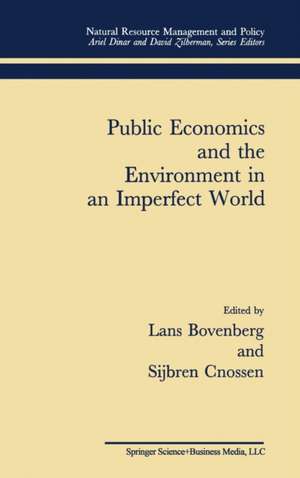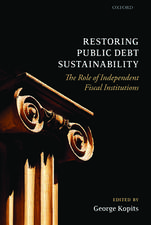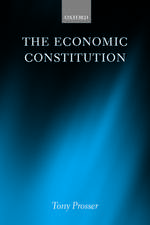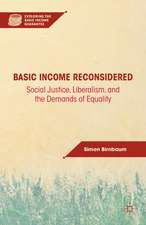Public Economics and the Environment in an Imperfect World: Evaluation in Education and Human Services
Editat de Lans Bovenberg, Sijbren Cnossenen Limba Engleză Hardback
What is evident from Public Economics and the Environment in an Imperfect World is that Coasian negotiations fail to internalize the costs of environmental degradation, often calling for public intervention through the market mechanism. In its consideration of such issues the book includes contributions on assessment problems, institutional aspects, the need for coordination and efficiency, and distribution issues.
| Toate formatele și edițiile | Preț | Express |
|---|---|---|
| Paperback (1) | 644.82 lei 6-8 săpt. | |
| SPRINGER NETHERLANDS – 28 oct 2012 | 644.82 lei 6-8 săpt. | |
| Hardback (1) | 707.63 lei 6-8 săpt. | |
| – | 707.63 lei 6-8 săpt. |
Din seria Evaluation in Education and Human Services
- 18%
 Preț: 952.57 lei
Preț: 952.57 lei - 20%
 Preț: 335.52 lei
Preț: 335.52 lei -
 Preț: 387.96 lei
Preț: 387.96 lei - 15%
 Preț: 641.71 lei
Preț: 641.71 lei -
 Preț: 388.52 lei
Preț: 388.52 lei -
 Preț: 384.86 lei
Preț: 384.86 lei - 15%
 Preț: 648.56 lei
Preț: 648.56 lei -
 Preț: 382.95 lei
Preț: 382.95 lei - 15%
 Preț: 645.60 lei
Preț: 645.60 lei -
 Preț: 387.96 lei
Preț: 387.96 lei -
 Preț: 397.16 lei
Preț: 397.16 lei -
 Preț: 387.75 lei
Preț: 387.75 lei -
 Preț: 388.52 lei
Preț: 388.52 lei -
 Preț: 389.88 lei
Preț: 389.88 lei - 15%
 Preț: 643.34 lei
Preț: 643.34 lei -
 Preț: 383.33 lei
Preț: 383.33 lei - 15%
 Preț: 584.76 lei
Preț: 584.76 lei - 15%
 Preț: 648.24 lei
Preț: 648.24 lei - 18%
 Preț: 1224.68 lei
Preț: 1224.68 lei - 18%
 Preț: 958.38 lei
Preț: 958.38 lei -
 Preț: 392.21 lei
Preț: 392.21 lei - 15%
 Preț: 644.30 lei
Preț: 644.30 lei - 15%
 Preț: 646.43 lei
Preț: 646.43 lei - 18%
 Preț: 1231.64 lei
Preț: 1231.64 lei -
 Preț: 388.72 lei
Preț: 388.72 lei - 18%
 Preț: 1227.04 lei
Preț: 1227.04 lei - 15%
 Preț: 646.43 lei
Preț: 646.43 lei -
 Preț: 394.12 lei
Preț: 394.12 lei - 15%
 Preț: 644.95 lei
Preț: 644.95 lei - 15%
 Preț: 650.19 lei
Preț: 650.19 lei -
 Preț: 390.25 lei
Preț: 390.25 lei
Preț: 707.63 lei
Preț vechi: 832.50 lei
-15% Nou
Puncte Express: 1061
Preț estimativ în valută:
135.42€ • 140.86$ • 111.80£
135.42€ • 140.86$ • 111.80£
Carte tipărită la comandă
Livrare economică 14-28 aprilie
Preluare comenzi: 021 569.72.76
Specificații
ISBN-13: 9780792396185
ISBN-10: 0792396189
Pagini: 374
Greutate: 0.72 kg
Seria Evaluation in Education and Human Services
ISBN-10: 0792396189
Pagini: 374
Greutate: 0.72 kg
Seria Evaluation in Education and Human Services
Cuprins
I. Introduction. 1. Public Economics and the Environment in an Imperfect World: An Introductory Summary; L. Bovenberg, S. Cnossen. 2. Public Finance and the Environment; A. Sandmo. 3. The Political Economy of Implementing Environmental Taxes; M. Pearson. II. An Imperfect World. 4. Taxing Bads by Taxing Goods: Towards Efficient Pollution Control with Presumptive Charges; G.S. Eskeland, S. Devarajan. 5. Global Climate Change, Energy Subsidies and National Carbon Taxes; B. Larsen, A. Shah. III. Assessment Problems. 6. How a Fee Per-Unit Garbage Affects Aggregate Recycling in a Model with Heterogeneous Households; T.C. Kinnaman, D. Fullerton. 7. Environmental Taxes on Intermediate and Final Goods When Both Can be Imported; J.M. Poterba, J.J. Rotemberg. IV. Institutional Aspects. 8. Are Incentive Instruments as Good as Economists Believe: Some New Considerations; H. Weck-Hannemann, B.S. Frey. 9. The Political Economy of the Environment in Developing Countries: Market Failure and Institutional Response; E. Wiesner. 10. Pollution Taxes as a Source of Budgetary Revenues in Economies in Transition; T. Zylicz. V. The Need for Coordination. 11. The Role of the European Union in Environmental Taxation; S. Smith. 12. Pure Global Externalities: International Efficiency and Equity; P.B. Musgrave. 13. International Coordination of Environmental Policies and Stability of Global Environmental Agreements; C. Carraro, D. Siniscalco. VI. Efficiency and Distribution Issues. 14. Environmental Taxation and the `Double Dividend': A Reader's Guide; L.H. Goulder. 15. Energy Levies and Endogenous Technology in an Empirical Simulation Model for the Netherlands; F. den Butter, et al. 16. Welfare and the Environment: Implications of a Recent Tax Reform in Norway; H. Vennemo. Name Index. Subject Index.













